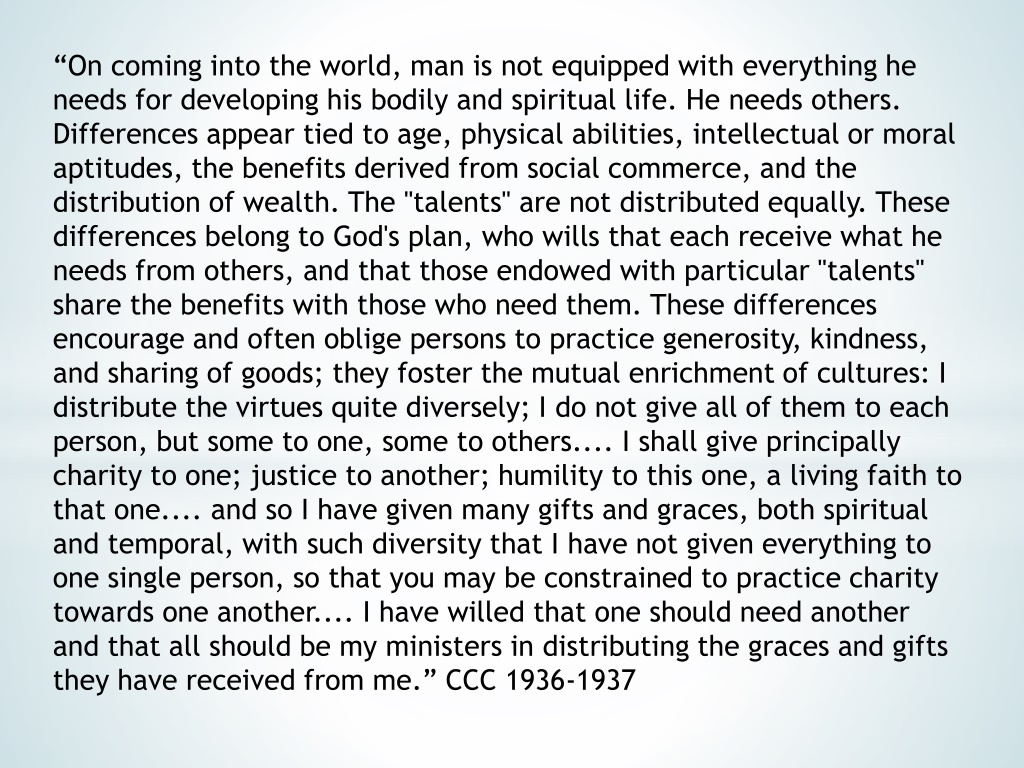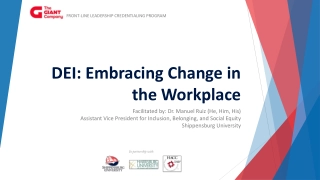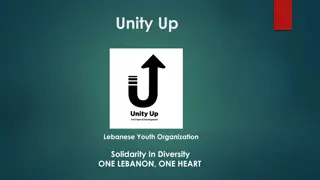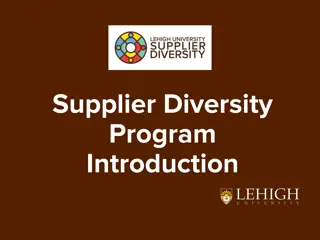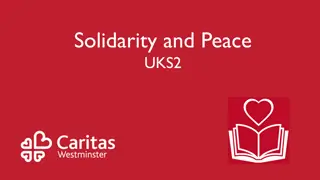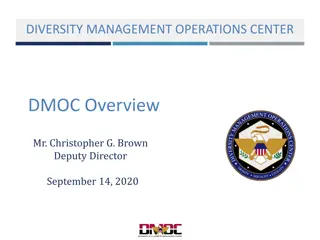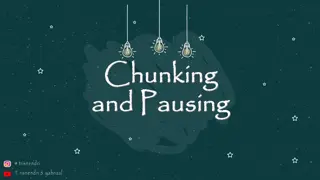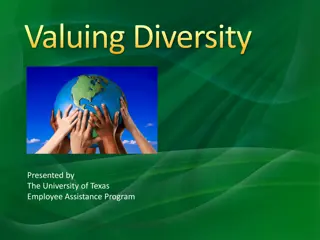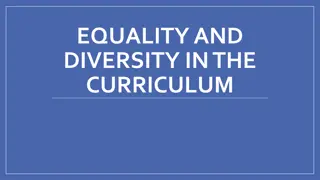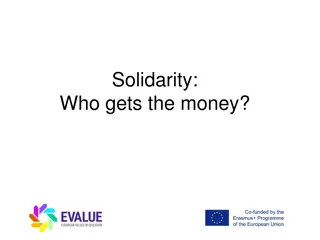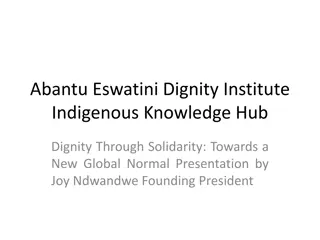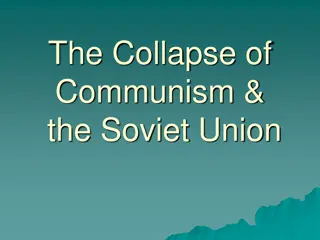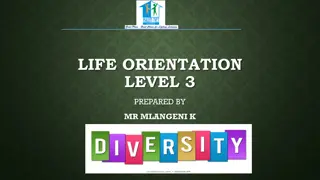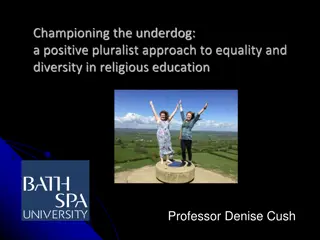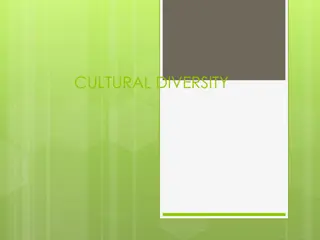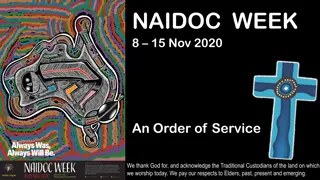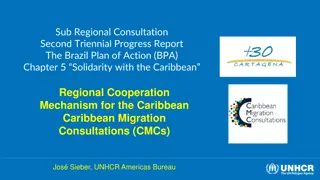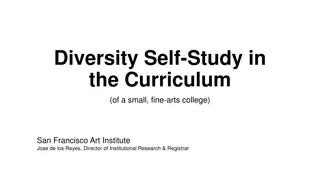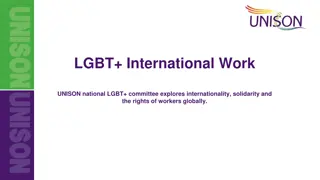Embracing Diversity and Solidarity
Encouraging generosity, kindness, and sharing of goods to foster mutual enrichment of cultures. Addressing sinful inequalities for fairer and more humane conditions, promoting solidarity for the common good. Love as a desire for others' well-being, rooted in God's love directing all towards it.
Download Presentation

Please find below an Image/Link to download the presentation.
The content on the website is provided AS IS for your information and personal use only. It may not be sold, licensed, or shared on other websites without obtaining consent from the author.If you encounter any issues during the download, it is possible that the publisher has removed the file from their server.
You are allowed to download the files provided on this website for personal or commercial use, subject to the condition that they are used lawfully. All files are the property of their respective owners.
The content on the website is provided AS IS for your information and personal use only. It may not be sold, licensed, or shared on other websites without obtaining consent from the author.
E N D
Presentation Transcript
On coming into the world, man is not equipped with everything he needs for developing his bodily and spiritual life. He needs others. Differences appear tied to age, physical abilities, intellectual or moral aptitudes, the benefits derived from social commerce, and the distribution of wealth. The "talents" are not distributed equally. These differences belong to God's plan, who wills that each receive what he needs from others, and that those endowed with particular "talents" share the benefits with those who need them. These differences encourage and often oblige persons to practice generosity, kindness, and sharing of goods; they foster the mutual enrichment of cultures: I distribute the virtues quite diversely; I do not give all of them to each person, but some to one, some to others.... I shall give principally charity to one; justice to another; humility to this one, a living faith to that one.... and so I have given many gifts and graces, both spiritual and temporal, with such diversity that I have not given everything to one single person, so that you may be constrained to practice charity towards one another.... I have willed that one should need another and that all should be my ministers in distributing the graces and gifts they have received from me. CCC 1936-1937
This virtue is more than justice because, rather than seeking a fair balance, it gives uncalculatingly, acknowledging the incalculable debts incurred by being nourished in networks of giving and receiving. At the same time, it is not more than justice, because offering such uncalculated giving is precisely what is owed. Christopher Franks, He Became Poor: The Poverty of Christ and Aquinas Economic Teachings, 187
There existssinful inequalities that affect millions of men and women. These are in open contradiction of the Gospel: Their equal dignity as persons demands that we strive for fairer and more humane conditions. Excessive economic and social disparity between individuals and peoples of the one human race is a source of scandal and militates against social justice, equity, human dignity, as well as social and international peace. CCC 1938
Solidarity is the firm and preserving determination to commit oneself to the common good; that is to say, to the good of all and each individual, because we are all really responsible for all. Sollicitudo Rei Socialis, 38
To love someone is to desire that persons good and to take effective steps to secure it (Caritas in Veritate, 7).
Everything has its origin in Gods love, everything is shaped by it, everything is directed towards it (CV 2).
(1) Charity is at the heart of the Churchs social doctrine. Everything has its origin in God s love, everything is shaped by it, everything is directed towards it (CV 2). CST is the proclamation of the truth of Christ s love in society (CV 5).
(2) Charity and Truth are necessarily connected. -Without truth, charity devolves into sentimentality. -Without charity, truth becomes cold.
(3) Charity and Justice are necessarily connected. READ: CV 6.2
(4) Charity and Justice demand a commitment to the common good. To desire the common good and strive towards it is a requirement of justice and charity (CV 7). The more we strive to secure a common good corresponding to the real needs of our neighbors, the more effectively we love them (CV 7).
(5) True progress must include union with God and communion among men. The problem facing us today is that: The de facto interdependence of people and nations is not matched by ethical interaction of consciences and minds that would give rise to truly human development (CV 9).
While men of the present day are drawn ever more closely together by social, technical and cultural bonds, it still remains for them to achieve full unity in Christ (LG 1).
As society becomes ever more globalized, it makes us neighbors but does not make us brothers (CV 19).
(6) The Church is about integral human development. Everything the Church does has the development of man in mind. The whole Church, in all her being and acting when she proclaims, when she celebrates, when she performs works of charity is engaged in promoting integral human development (CV 11).
Authentic human development concerns the whole of the person in every single dimension. Without the perspective of eternal life, human progress in this world is denied breathing-space. Enclosed within history, it runs the risk of being reduced to the mere accumulation of wealth (CV 11).
Such development requires a transcendent vision of the person, it needs God; without him, development is either denied, or entrusted exclusively to man, who falls into the trap of thinking he can bring about his own salvation, and ends up promoting a dehumanized form of development (CV 11).
(7) Development includes the whole of man and all men. Paul VI said that authentic development must be integral, that is, it has to promote the good of every man and of the whole man (CV 18).
What we hold important is man, each man and each group of men, and we even include the whole of humanity (CV 18). The truth of development consists of its completeness: if it does not involve the whole man and every man, it is not true development (CV 18).
(9) The view of development has economic, social, and political implications. Economic activity, social interaction, and political structures and participation must all be rooted in a commitment to the common good.
(10) International Peace is connected to Economic Justice Excessive economic and social disparity between individuals and peoples of the one human race is a source of scandal and militates against social justice, equity, human dignity, as well as social and international peace (CCC 1938).
Injustice, excessive economic or social inequalities, envy, distrust, and pride raging among men and nations constantly threaten peace and cause wars. Everything done to overcome these disorders contributes to building up peace and avoiding war (CCC 2317).
The problem of food insecurity needs to be addressed within a long-term perspective, eliminating the structural causes that give rise to it and promoting the agricultural development of poorer countries (CV 27).
(11) Openness to life is at the center of true development (CV 28).
(12) Building a Culture of Life is essential to fostering authentic development. READ: CV 28.4
(13) The need for Religious Liberty God is the guarantor of man s true development, inasmuch as, having created him in his image, he also establishes the transcendent dignity of men and women and feeds their innate yearning to be more. Man is not a lost atom in a random universe: he is God s creature, whom God chose to endow with an immortal soul and whom he has always loved. If man were merely the fruit of either change or necessity, or if he had to lower his aspirations to the limited horizon of the world in which he lives, if all reality were merely history and culture, and man did not possess a nature destined to transcend itself in a supernatural life, the one could speak of growth, or evolution, but not development (CV 29).
(14) Care for the Environment as an Ethical Imperative. The environment is God s gift to everyone, and in our use of it we have a responsibility towards the poor, towards future generations and towards humanity as a whole (CV 48).
It should also be stressed that it is contrary to authentic development to view nature as something more important than the human person. This position leads to attitudes of neo-paganism or a new pantheism human salvation cannot come from nature alone, understood in a purely naturalistic sense. This having been said, it is also necessary to reject the opposite position, which aims at total technical dominion over nature, because the natural environment is more than raw material to be manipulated at our pleasure; it is a wondrous work of the Creator containing a grammar which sets forth ends and criteria for its wise use, not its reckless exploitation (CV 48).
Immigration laws badly in need of reform are used today as an excuse not to welcome the stranger It is true that a nation has the right to enact laws that regulate immigration but those laws are always subject to the greater laws of God. They must be just and must preserve the dignity of each human person. [The Virtue of Love Part One: Welcoming the Stranger]
No man-made law, no circumstance, no custom can excuse us from the obligation to love our neighbor, whether the neighbor is a Samaritan or a Hispanic, whether he speaks our language or not. The demands of Christ s call to love our neighbor are great indeed. [The Virtue of Love Part One: Welcoming the Stranger]
1. Reform is necessary. Pope Benedict XVI says that immigration is an extremely important issue that requires bold, forward-thinking policies of international cooperation if it is to be handled effectively. [Caritas in Veritate, 62] 2. Reform must be based upon the Gospel call to love our neighbor. Vatican II stated: Everyone must consider his every neighbor without exception as another self, taking into account first of all his life and the means necessary to living it with dignity. [Gaudium et Spes, 27] 3. Reform must consider the rights of all involved. Such policies should set out from close collaboration between the migrants counties of origin and their countries of destination; it should be accompanied by adequate international norms able to coordinate different legislative systems with a view to safeguarding the needs and rights of individual migrants and their families, and at the same time, those of the host countries. [Caritas in Veritate, 62]
Guiding Principles for Immigration Reform 1. The Root Causes of Migration 2. Family-Based Immigration Reform 3. Provide Pathways to Legalization 4. Establish a Guest Worker Program 5. Create Humane Immigration Enforcement Visit: www.justiceforimmigrants.org
In the Church no one is a stranger, and the Church is not foreign to anyone, anywhere. As a sacrament of unity and thus a sign and a binding force for the whole human race, the Church is the place where illegal immigrants are also recognized and accepted as brothers and sisters. It is the task of the various Dioceses actively to ensure that these people, who are obliged to live outside the safety net of civil society, may find a sense of brotherhood in the Christian community. Solidarity means taking responsibility for those in trouble. [World Migration Day 1995]
